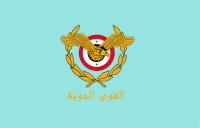Syrian Air Force
| Syrian Arab Air Force القوات الجوية العربية السورية |
|
|---|---|

Syrian Arab Air Force Emblem
|
|
| Founded | 1948 |
| Country |
|
| Branch | Air Force |
| Type | Military aviation |
| Role | Aerial warfare |
| Size | 60,000 (including 20,000 reserve) |
| Part of | Syrian Armed Forces |
| Nickname(s) | SyAAF |
| March | We are the Eagles |
| Equipment | ~ 670 aircraft at 2011 461 in 2016 |
| Engagements |
Six-Day War Yom Kippur War 1982 Lebanon War Syrian Civil War 2014 Northern Iraq offensive |
| Commanders | |
| Chief of Air Staff | General Issam Hallaq |
| Insignia | |
| Roundel |  |
| Air Force Ensign |  |
| Aircraft flown | |
| Attack |
MiG-23 Su-24 Su-22 Mi-25 Gazelle |
| Electronic warfare |
Mi-8 |
| Fighter |
MiG-29 MiG-23 MiG-21 |
| Interceptor |
MiG-25 Inactive MiG-31 |
| Reconnaissance |
MiG-25 MiG-21 |
| Trainer |
L-39 MBB 223 MFI-17 |
| Transport |
An-26 An-24 Il-76 Mi-17 Mi-8 |
The Syrian Arab Air Force (Arabic: القوات الجوية العربية السورية, Al Quwwat al-Jawwiyah al Arabiya as-Souriya), literally Syrian Arab Air Forces, also often referred to as the Syrian Air Force, is the Aviation branch of the Syrian Armed Forces. It is variously abbreviated in English to SAF, SAAF, or SyAAF. It was established in 1948. Land-based air defense systems are grouped under the Syrian Air Defense Force, which split from both the Air Force and the Army. The Syrian Arab Airforce does not have the ability to carry out operations at night.
The end of World War II led to a withdrawal of the United Kingdom and France from the Middle East, and this included a withdrawal from Syria. In 1948, the Syrian Air Force was officially established after the first class of pilots graduated from flight schools in the United Kingdom. The embryonic force saw limited participation in the 1948 Arab-Israeli War, conducting bombing raids against Israeli forces and settlements. One North American Harvard was lost to ground fire while attacking Ayelet Hashahar on 16 July, and another possibly shot down by Morris Mann (flying an Avia S-199) on 10 June. The Syrian Air Force claimed its sole kill of the war on 10 July when a Harvard supposedly shot down an Avia S-199 flown by Lionel Bloch.
Military governments formed after the war sought to bolster the air force, which began equipping with Fiat G.59s, ex-Egyptian Macchi C.205s and Supermarine Spitfire Mk 22s. In September 1952 the SAF received its first jet aircraft, the Gloster Meteor F.8. Additional Meteors, including the NF.13 night fighting variant, were delivered by the mid-1950s.
...
Wikipedia
